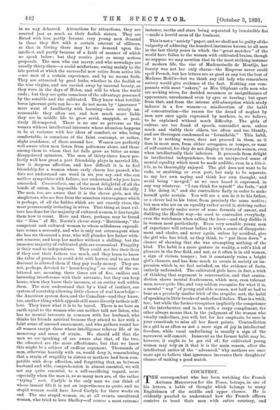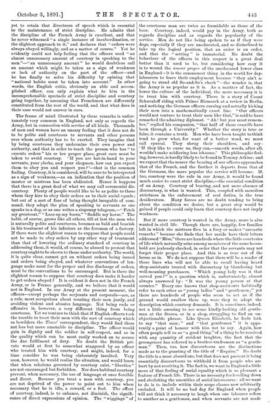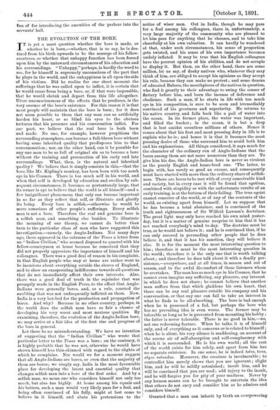COURTESY.
THE correspondent who has been watching the French Autumn Mancenvres for the Times, betrays, in one of his letters, a habit of thought which belongs to many Englishmen of the middle and upper classes. He is evidently puzzled to understand how the French officers contrive to treat their men with entire courtesy, and
yet to retain that directness of speech which is essential to the maintenance of strict discipline. He admits that the discipline of the French Army is excellent, and that he never witnessed "a single instance of insubordination, or the slightest approach to it," and declares that "orders were always obeyed willingly, and as a matter of course." Yet he evidently could not help feeling that the officers used "an almost unnecessary amount of courtesy in speaking to the men "—" an unnecessary amount" he would doubtless call an amount which might be taken as a sign of weakness or lack of authority on the part of the officer—and he has finally to solve his difficulty by opining that "national habits must be taken into account." In other words, the English critic, obviously an able and accom- plished officer, can only explain what to him is the incomprehensible spectacle of strict discipline and courtesy going together, by assuming that Frenchmen are differently constituted from the rest of the world, and that what does in their case would not answer in ours.
The frame of mind illustrated by these remarks is unfor- tunately very common in England, not only as regards the Army, but in connection with service of all kinds. Thousands of men and women have an uneasy feeling that it does not do to be polite and courteous to servants and other persons over whom authority has to be exerted. They imagine that by being courteous they undermine their own power and authority, and that in order to teach the person who has "to execute orders" his or her proper place, great care must be taken to avoid courtesy. If you are hat-in-hand to your servants, your clerks, and your shopmen, how can you expect them to obey you and respect you ? '—that is the common feeling. Courtesy, it is considered, will be sure to be interpreted as a sign of weakness,—as an indication that the position of master or mistress has been abdicated. Hence it happens that there is a great deal of what we may call ceremonial dis- courtesy. Plenty of people would like to be as polite to those whom they hire to obey their orders as to their social equals ; but out of a sort of fear of being thought incapable of com- mand, they adopt the plan of speaking to servants as one speaks to a dog, or as one writes a sixpenny telegram,—" Fetch my greatcoat," "Lace up my boots," "Saddle my horse." The habit, of course, grows like all others, till at last the man who is naturally polite and courteous, becomes as bald and bearish in his treatment of his inferiors as the foreman of a factory. If there were the slightest reason to suppose that people could not be made to obey orders by any other way of treatment than that of lowering the ordinary standard of courtesy in addressing them, it would, of course, be absurd to protest that courtesy ought to be shown to those under authority. The world, it is quite clear, cannot get on without orders being issued and orders being obeyed, and whatever conventions of lan- guage make most for the proper and due discharge of orders, must be the conventions to be encouraged. But is there the slightest reason to suppose that courtesy does make it harder to get orders obeyed? It is evident it does not in the French Army, or in France generally, and we believe that it would not in England. In our Army at the present moment, the officers—except perhaps the serjeants and corporals—are, as a rule, most scrupulous about treating their men justly, and avoiding violent and abusive language. Not being rude or offensive is, however, a very different thing from being courteous. Yet we venture to think that if English officers took the trouble to treat their men with the sort of courtesy which so bewilders the Times' correspondent, they would find them not less but more amenable to discipline. The officer would gain in dignity and the soldier in self-respect, and so in the quality which can be most easily worked on to secure the due fulfilment of duty. No doubt the British pri- vate would at first be somewhat staggered by an officer who treated him with courtesy, and might, indeed, for a time consider he was being elaborately insulted. Very soon, however, he would realise the situation, and would learn that when relations governed by courtesy exist, " liberties " are not encouraged but forbidden. Nor does habitual courtesy prevent, when necessary, the use of language at once forcible and direct. Because you treat a man with courtesy, you are not deprived of the power to point out to him when necessary that he is idle, a coward, or a fool. The effect of courtesy, indeed, is to enhance, not diminish, the signifi- cance of direct expressions of opinion. The " wiggings " of the courteous man are twice as formidable as those of the boor. Courtesy, indeed, would pay in the Army, both as regards discipline and as regards the popularity of the service. Men do not like being spoken to as if they were dogs, especially if they are uneducated, and so disinclined to take up the logical position, that an order is an order, and that the " setting " is immaterial. No doubt the behaviour of the officers in this respect is a great deal better than it used to be, but considering how easy it is to wound the amour propre of the uneducated lower class in England—it is the commonest thing in the world for day- labourers to leave their employment because "they ain't a- going to stand old So-and-So's cheek "—the wonder is, that the Army is as popular as it is. As a mattter of fact, the lower the culture of the individual, the more necessary it is to treat him with courtesy. There is a story of Count Schuvaloff riding with Prince Bismarck at a review in Berlin, and noticing the German officers cursing and actually kicking their men into a mathematically exact line. "Our officers would not venture to treat their men like that," is said to have remarked the admiring diplomat. " Ah ! but you must remem- ber," replied his companion, "that half of these canaille have been through a University." Whether the story is true or false, it contains a. truth. Men who have been taught to think tend to grow what, for want of a better word, we must call cynical. They shrug their shoulders, and say : If they like to curse us, they can,—smooth words, after all, wouldn't make soldiering leas irksome.' This philosophic feel- ing, however, is hardly likely to be found in Tommy Atkins; and we expect that the nearer the bearing of our officers approaches that of the French, and the further it departs from that of the Germans, the more popular the service will become. If, too, courtesy were the rule in our Army, it would be found much easier to exact strict discipline,—the essential condition of an Army. Courtesy of bearing, and not mere absence of discourtesy, is what is wanted. This, coupled with merciless strictness in the enforcement of real duties, is the true desideratum. Many forces are no doubt tending to bring about the condition we desire, but a great step would be gained if people could only learn that courtesy does not imply weakness.
But if more courtesy is wanted in the Army, more is also wanted in civil life. Though there are, happily, few families left in which the mistress flies in a fury or makes "sarcastic remarks" because she finds that her maids have their letters addressed "Miss," there are hundreds where the little courtesies of life which naturally arise among members of the same house- hold are jealously checked, in order that the servants may not forget their proper place. And this is as true out of the house as in. We do not suppose that there will be a reader of these lines who will not be able to recall having heard shop-assistants treated with discourtesy by blundering but well-meaning purchasers. "Which young lady was it that served you ?" is a question which is, unfortunately, almost always answered by : "It was the young person at that counter." Every one knows that shop-assistants habitually refer to each other as "young ladies" and " gentlemen ;" yet there are hundreds of people who seem to act as if the ground would swallow them up, were they to adopt the description which courtesy demands. It is sometimes, indeed, not a little amusing to see some kindly-looking old gentle- man at the Stores, or in a shop, struggling to find an un- objectionable phrase. Like Queen Elizabeth, he feels loth to say "that man ; " and "that gentleman" it is appa- rently a point of honour with him not to say. Again, how often people tell us as "a good thing," of a thing to be received with any quantity of strident laughter, the fact that the greengrocer has referred to a brother-tradesman as "a gentle- man." Then, too, how discourteous are the distinctions made as to the granting of the title of "Esquire." No doubt the-title is a most absurd one, but that does not prevent it being essentially discourteous to withhold it from people who are hurt by not receiving it. The fact is, we want in England a little more of that feeling of social equality which is so pleasant a feature of French life. There is no necessity for levelling down and abolishing the amenities of social intercourse : all we want to do is to include within their scope classes now arbitrarily excluded. It will be no bad day for England when people will not think it necessary to laugh when one labourer refers to another as a gentleman, and when servants are not made fun of for introducing the amenities of the parlour into the servants' hall.




































 Previous page
Previous page